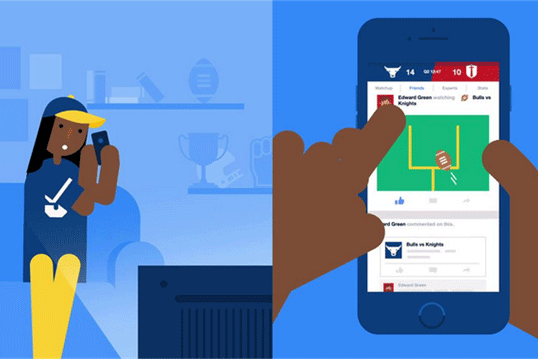Sports fans will take to social platforms and messaging apps to cheer on their teams and banter with their mates. But there could be some big changes in the ways brands tap into this year's sporting fervour.
In January Facebook announced theSports Stadium, a hub that aggregates all the buzz, chatter and conversations from Facebook which occur during live sporting events.
Timed to coincide with the Super Bowl, Facebook hopes it will steal a march on Twitter, the number one platform for interaction during sports events.
While it’s a little too early too tell how successful it will be, this year’s international sporting events should prove to be its litmus test.
Equally, You Tube has made developments within the sporting world – it beta tested real-time ads during the Super Bowl, allowing advertisers to time their spots with big moments during live events. It’s likely that it will roll this out to other big sporting occasions.
But Twitter, Facebook and YouTube will not be the only players in the sports game this year. Messaging apps such as WhatsApp, kik, WeChat and Line in Asia offer a brilliant and simple way for people to chat together during live sports. They naturally lend themselves to having friends on hand, giving quick-fire responses and exchanging content.
The future of always-on marketing
Brands will use the messaging apps for engaging with sporting moments. High time. The social media model of the last few years is not working.
Brands thought they had to be always on, and ended up spouting non-stop into an already cluttered world.
Messaging could help brands find the true meaning of always on - to be there when the opportunity is right, at the right time and at the right place.
So in place of misguided always-on marketing comes a new marketing mechanic born out of messaging.
It flips the old model head on its head. It’s less about trying to always be where people might be looking.
Instead, content is brought to you as you require it, on demand and where you are. It can exist during a conversation which you’re genuinely having in real time with your friends.
For instance, takeaway brands have a chance of leveraging the European Championships this summer by providing a simple service integrated into a group conversation.
Group chats which spring up around a big game might be peppered with game-like mechanics from McDonald's, Burger King or Papa Johns, encouraging audiences to grab their takeout during the half-time break, offering discounts, freebies, and extras.
The messaging ‘bubble’ can facilitate these kinds of incentivised exchanges in a far more legitimate and effective fashion than merely ‘pushing’ through brands’ owned channels or promoting through their own nuggets of media.
Brands associated with sport can target group chats to offer tickets to the big game, travel booking, or shopping for merchandise. The instantaneous nature and ability to keep track of conversation threads ensures a far more immediate and seamless user experience. This builds trust, loyalty and ultimately brand love.
Facebook’s Sport Stadium hub feels a perfect natural next step for fans of the platform. But it may be the rookie messaging platforms which prove to be the eventual winners. Game on, indeed.


